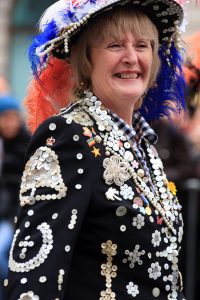At the recent Modern Cockney Festival, celebrations concluded with the official recognition of Cockney as a community language by Tower Hamlets Council in East London.

The month-long festival featured cultural traditions including an embellished ‘pearly Burka’ – homage to the Islamic community of East London and the historic Cockney ‘Pearly Kings and Queens’, and an open discussion ‘What does it mean to be a Cockney today?’.
The word Cockney itself dates back as far as 1362 and was traditionally only applied to those born within hearing distance of the bells of Mary-le-Bow Church, Cheapside, City of London. Due to housing, hospital access and modern ethnography however, this definition was rendered obsolete years ago.
The linguistic aspect of Cockney primarily denotes a dialect and accent, its own rhyming structure Cockney Rhyming Slang evolving with migration to London. Cockney vernacular began in the 1300s with references to Middle English, and continued to change while adopting phrases from Yiddish, Romani, and German in the 1800s.
Cockney Rhyming Slang fully materialized as a play on words in the 1840s, when East Enders (habitants of London’s East End) were trying to make a living through trading on the edges of legality and under-the-radar activity. They required an elusive method of communicating with passers-by without alerting the police, using phrases like bees and honey to mean ‘money’ and bottle and stopper – ‘copper’ (police officer).
In 2011, then-University of Lancaster academic Paul Kerswill predicted that Cockney accents “would disappear in 30 years.” He felt that while older people still spoke with the recognizable Cockney accent, this was no longer the case for a younger generation.
In the 12 years since, many Londoners feel ‘Cockenydom’ has evolved into something sentimental, while linguistically, Mulitcultural London English (MLE) has taken a stronghold in Greater London. MLE is characteristically similar to the Cockney accent and dialect, but has additional influences from other global languages reflecting modern immigration to London.
Andy Green and Saif Osmani, organizers of the Modern Cockney Festival, are embracing the change. Green says “The working class don’t have cultural institutions to fly their flag, and the festival was to explore what it means to be Cockney and to celebrate that. The association is historically a negative one.” He added that a current qualification for being a Cockney is really being a “non-posh” person with London heritage, rather than being born near any particular church. The criteria and sentiment extends to those in the counties surrounding London’s South East.
“Cockneydom spans far and wide. People [at the festival] identify as Bangladeshi Cockneys or Kent Cockneys. They all have some roots and culture in common, even if their community has had more influences,” he explained.
Dr Amanda Cole, a sociolinguist from the University of Essex, theorizes that the classic Cockney accent and dialect has migrated to Essex—the neighhboring county to London’s east.
She says, “I had this idea in my head that Cockney is not dead, it’s just moved to Essex. My feeling was that there was a real enclave of Cockney; just anecdotally, I felt there was a lot of Cockney spoken by young people.”
Cole’s grandparents were relocated to Essex in a slum-clearance program after the Second World War, along with thousands of other people living in dilapidated Victorian houses. She has spent the last six years studying accents in Essex and has found little evidence of significant change since the war.
In 2023, the classic characteristics of the Cockney accent, such as dropping the “t” in the middle of a word, or pronouncing “think” as “fink” and “milk” as “miwk”, are now seen as linguistically Essex features.
The notion of Cockney identity and borders will always be a contested issue, but Cole says a younger generation of Essex residents do not perceive themselves as Cockney, “As soon as they started moving to Essex, they began to consider their accent an Essex one. It happened very quickly. As soon as the community relocated, there started to be this reinterpretation of Essex. Though some people do still consider themselves to some extent to have a Cockney accent, this has rapidly been changing to identifying with an Essex one.”





